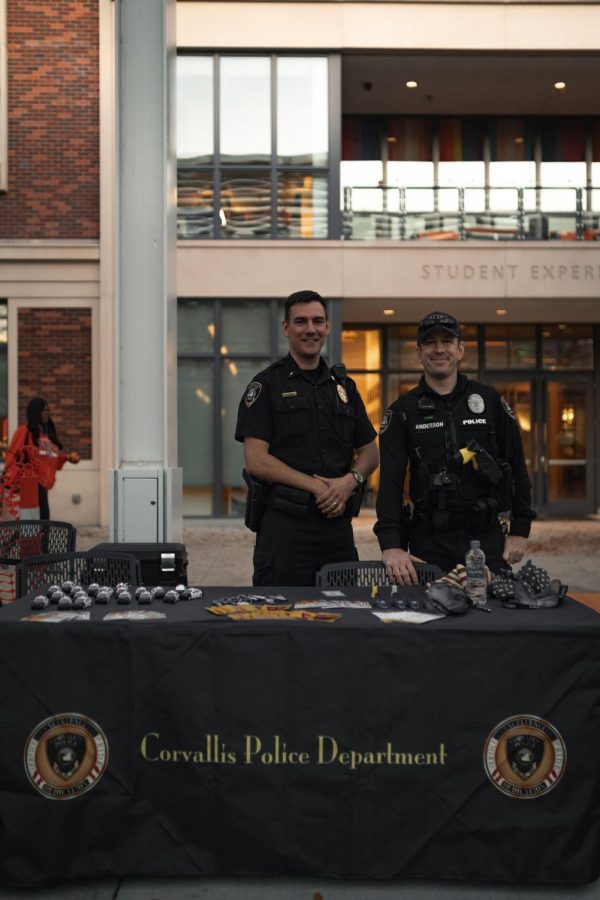Public Safety Advisory Committee to recommend a transitional campus law enforcement service provider
December 14, 2019
After Oregon State Police terminated its contract with Oregon State University on Oct. 23, OSU began a search to find transitional and long-term law enforcement service providers for its Corvallis campus shortly after.
The first update on this process came on Nov. 25, when an email sent by OSU President, Edward Ray, stated that the Vice President for Finance and Administration, Mike Green, had convened the university’s Public Safety Advisory Committee.
The advisory committee’s purpose will be to evaluate and provide recommendations for transitional and long-term campus law enforcement service providers. The committee is expected to make its recommendations for transitional law enforcement service providers to Green by Dec. 16, who will then make his final recommendations to Ray.
The chosen transitional law enforcement service provider will provide public safety for a two-year transition period beginning July 1, 2020 through June 30, 2022. After that date, on July 1, 2022, a long-term law enforcement service provider will take the place of the transitional service and address public safety needs and services. Decisions and recommendations on long-term law enforcement service providers are expected by the end of spring term.
A Dec. 2 email sent by Ray said the University was entering into discussions with the city of Corvallis for the possibility of the Corvallis Police Department serving as a transitional law enforcement service provider.
Mark Shepard, Corvallis city manager, said the city and OSU are just starting conversations. It is yet to be determined whether CPD can or will take on transitional and/or long-term law enforcement services for OSU.
“The partnership will need to be structured such that services to the rest of the Corvallis community is not compromised,” Shepard said via email. “Working through those details and what OSU will need to bring to the table to make this work from the city’s perspective is what our conversations will be focused on.”
Paul Odenthal, the senior associate vice president for Administration, and co-chair for the advisory committee, said it is too early to imagine how any specific transitional service arrangement would look at this time. However, he said any arrangement made will be aligned with the values of the university and the OSU community.
“The input we receive from our planned community engagement process will help the advisory committee consider long-term safety needs, services to be provided and what departments at OSU and partner agencies may best provide these services,” Odenthal said via email.
The advisory committee is made up of more than a dozen students, faculty and staff and includes representatives from the Associated Students of Oregon State University, the Faculty Senate, the offices and departments of Institutional Diversity, Public Safety, Faculty Affairs, Athletics, Student Affairs, Compliance, University Relations and Marketing, General Counsel and Finance and Administration.
Odenthal said the advisory committee is currently meeting once a week. The time, location and frequency of the meetings vary based on the needs of the members and the deliverables. The committee is co-chaired by Odenthal and Vice President and Chief Diversity Officer, Charlene Alexander.
For long-term law enforcement service providers, OSU will be taking recommendations from the Public Safety Advisory Committee, as well from the general public during winter and spring term.
Vice President of University Marketing and Relations, Steve Clark, said the committee will conduct various forms of community engagement processes in the winter and spring. This includes launching a website, holding community stakeholder meetings and gathering community input on campus safety needs and services.
According to Shepard, conversations about potential partnerships between the city and Corvallis were brief during the Dec. 2 Corvallis city council meeting. Members of the council were supportive of staff entering into conversations about building a potential partnership, but no commitment to a specific outcome was made. However, CPD was considered a potential option as both a transitional and long-term law enforcement service provider for OSU.

















































































![Newspaper clipping from February 25, 1970 in the Daily Barometer showing an article written by Bob Allen, past Barometer Editor. This article was written to spotlight both the student body’s lack of participation with student government at the time in conjunction with their class representatives response. [It’s important to note ASOSU was not structured identically to today’s standards, likely having a president on behalf of each class work together as one entity as opposed to one president representing all classes.]](https://dailybaro.orangemedianetwork.com/wp-content/uploads/2025/03/Screenshot-2025-03-12-1.00.42-PM-e1741811160853.png)
























